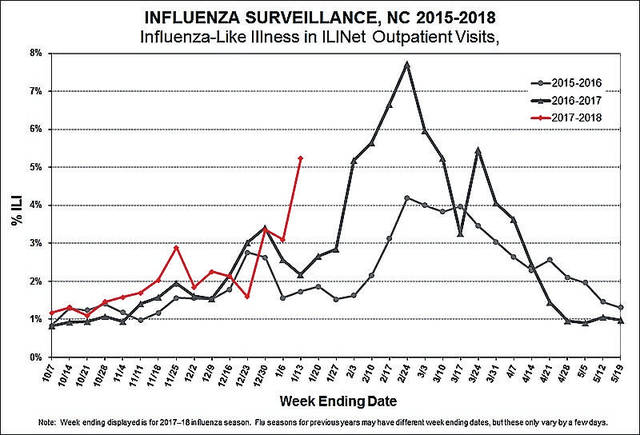Local health care officials are urging anyone who hasn’t received the flu vaccination to get one as soon as possible, as the peak of the season hasn’t begun.
This year’s flu season is already being recorded as the most widespread since health officials began keeping track of the numbers 13 years ago. According to Jo Ellen Naylor, child health and immunization coordinator for the Sampson County Health Department, the flu virus has been widespread throughout North Carolina, as well as across the Untied States. In all, 32 states, including North Carolina, are experiencing “high” influenza activity, according to the Center for Disease Control.
This season, the predominate strain has been reported as H3N2, which causes the worst outbreaks of the two influenza A viruses and two types of the influenza B viruses that circulate among people. While this strain has been around for nearly five decades, because of its ability to change more quickly to get around the human body’s immune system than other viruses targeted in this year’s vaccine.
“We have definitely seen an increase in the numbers of patients requesting the flu vaccine,” Naylor said. “The media coverage about the high increase of reported flu cases has helped to educate the public about the importance of getting vaccinated, thus increasing requests for flu vaccines.”
Sampson Regional Medical Center reported its first confirmed case of the virus Oct. 17, and between that time and Jan. 22, there has been 82 positive flu cases confirmed in the hospital laboratory. This does not include any of the hospital’s outside practices.
While many feel it’s too late to receive the vaccination, local health care officials are urging anyone that hasn’t received the vaccine to get it as quickly as possible.
“As long as there are flu cases being reported, it isn’t too late to get vaccinated,” Naylor explained. “In fact, if anyone has not been vaccinated, we highly recommend to get vaccinated as soon as possible.”
Flu season runs through May for this area.
According to Naylor, once a vaccine enters the body, it is seen as a threat. The immune system triggers an immune response by producing antibodies. Once the threat is over, most of the antibodies breakdown. However, memory cells remain in the body and the when the body encounters that antigen, like the flu virus, again, it quickly starts producing antibodies to fight the virus or bacteria.
The flu, Wanda Holden, infection control nurse with SRMC, explained, is very dangerous. To date, the hospital has had 17 admissions due to the flu. SRMC has set restrictions on the visitor policy to help prevent unnecessary spread of the virus.
“Flu can be very dangerous for anyone, but especially dangerous in infants and young children, people 65 years of age and older, pregnant women, and people with certain health conditions or a weakened immune system,” Naylor said. “For that reason, everyone that can get vaccinated, should get vaccinated.”
The most common flu symptoms are fever, chills, cough, sore throat, runny or stuffy nose, muscle or body aches, headaches, fatigue and vomiting or diarrhea.
“Stay home when you are sick,” Naylor urged. “You should stay home for 24 hours after the fever is gone.”
According to Holden, tips for helping prevent the spread of the virus include:
• Hand and respiratory hygiene is the next best step to preventing the spread of flu. Hand washing helps stop the spread of germs. It’s recommended that you wash often with soap and water. If soap and water are not available, use an alcohol-based hand cleaner.
• It’s also important to remember to disinfect surfaces and objects that may come in contact with flu germs. In the home and workplace, disinfect phones, keyboards, door handles, and other commonly touched surfaces. Avoid touching your eyes, nose, and mouth to prevent the spread of germs.
• Avoid close contact with people who are sick, and if you are sick, try to stay home for at least 24 hours after your fever is gone. It’s also recommended that people wear a face mask to reduce spreading or catching germs.
• If you cough or sneeze, use a tissue to cover your mouth and nose, or direct your cough or sneeze into your elbow. This way, you are less likely to touch a surface and spread germs.
Local pharmacies and physician officers, along with the local health department, offer the flu vaccine daily. Anyone who is exhibiting flu-like symptoms should seek medical attention.

